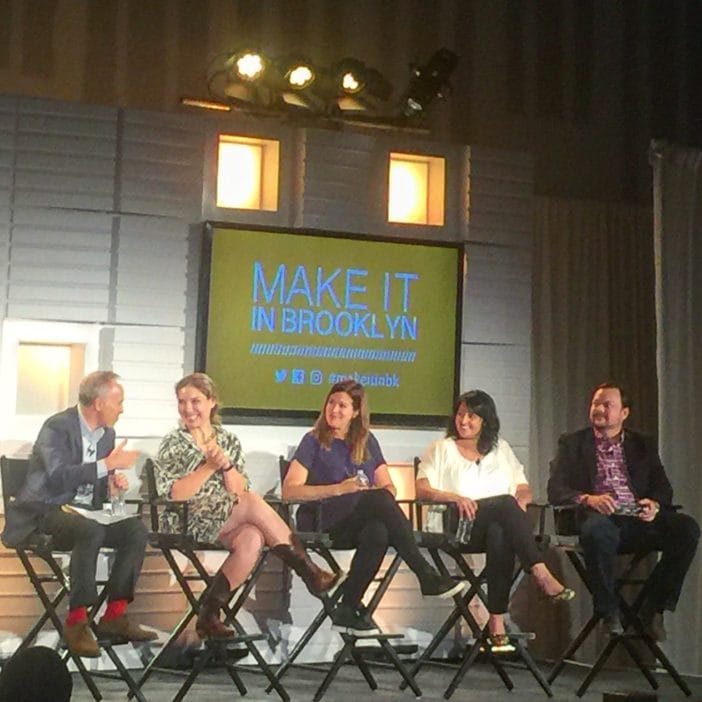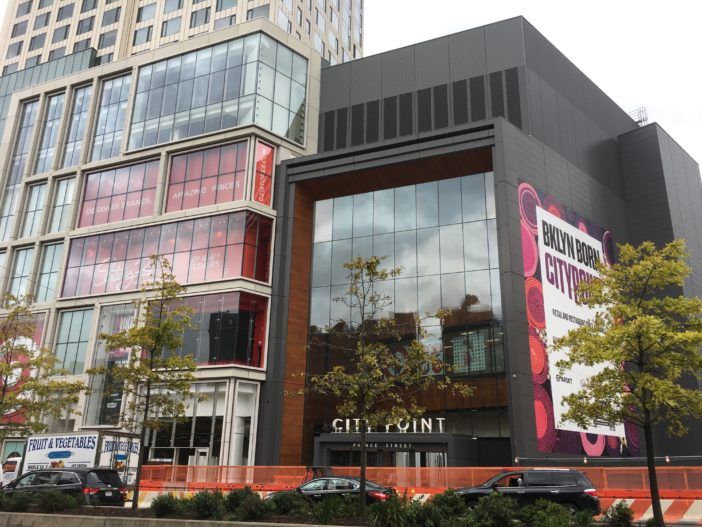Innovators Discuss What It Takes To #MakeItInBK At Summit


This year’s Make It In Brooklyn was marked by a self-aware and, at times, self-effacing attitude towards the borough’s emergence as an economic and cultural powerhouse.
Fittingly, this year’s event took place on September 28 at the still unfinished City Point development (1 DeKalb Avenue, between Albee Square West and Fleet Street), beginning with a networking breakfast at 8am and was followed by panels which began at 10:30am.
“I came all the way up the hill from Brooklyn Bridge Park, where I led the team to transform an inaccessible waterfront into a world-class park,” said Regina Myer, the new president of the Downtown Brooklyn Partnership, replacing Tucker Reed. According to Myer, over $400 million in public funds have led to over $11 billion in private sector growth.
“Just like a startup, we need to maintain our authenticity when it scales. Downtown Brooklyn must stay true to its rich history,” said Myer in remarks that presaged subsequent speakers’ remarks.

Myer was followed by “Size Matters”, a real estate panel moderated by journalist Matt Chaban and featuring MaryAnne Gilmartin of Forest City Ratner Companies and Michael Stern of JDS Development Group.
“The responsibility we have…is to make sure it doesn’t become a commoditized place,” said Gilmartin, who stressed the uniqueness of Brooklyn’s brand.
Gilmartin and Stern emphasized the need for increased density as a means of combatting housing price inflation, and largely agreed that Downtown’s development, while unanticipated, will not soon abate. Gilmartin rejected the idea that there is a bubble in Brooklyn.
Gilmartin and Stern sounded hopeful notes about the reinstatement of the 421a tax exemption, which they agreed was a vital part of developing rental units. Highlighting the need for more housing, Gilmartin said that 461 Dean Street received over 80 thousand applications for its 181 affordable units, while a nearby Pacific Park development has received over 89 thousand applications.
Tying into real estate, Ya-Ting Liu of the Friends of the Brooklyn-Queens Connector followed the real estate panel with a brief presentation on the proposed BQX streetcar that would run from Astoria to Sunset Park. Liu’s presentation focused on the development of the Brooklyn and Queens waterfront, and the necessity of new public infrastructure spending to maximize its growth potential while adding a new transit option an underserved area.
After a brief lunch that featured some of the most innovative eats in the county of Kings, Claude Silver, Chief Heart Officer of VaynerMedia, delivered the keynote address. Silver discussed creating a space where people and especially millenials, “can hustle” and emphasized the need for connections that build trust.

Silver was followed by “Launch. Scale. Thrive.”, a panel moderated by Jacob Weisberg of Slate. Weisberg was joined by Dana Mauriello of Etsy, JB Osborne of Red Antler, Marco Perry of Pensa, and Sherine Kazim of Huge.
“It’s obvious that the creative class lives more in Brooklyn than anywhere else and it’s obvious that the technical class lives more in Brooklyn than anywhere else,” said Weisberg.
The panelists largely agreed upon the need to maintain their companies’ authenticity, even as they went through the process of scaling up in size.
“Doing social good becomes a competitive advantage when you’re trying to attract young workers,” said Weisberg.
Many of those young workers driving Brooklyn’s innovation economy are in tech and its adjacent industries, and that startup culture was the focus of the final panel, entitled “Show Me The Money”. Wil Oremus of Slate moderated the panel, which included Rachel Haot of 1776, which recently planted its New York City headquarters in the Navy Yard’s Building 77, John Frankel of ff Venture Capital, Michael Duda of Bullish, Shawn Cheng of Vayner/RSE, and Peter Boyce II of General Catalyst.
Following the day’s events, there was a “pitch contest” at 6pm at the CoLab-Factory (14 DeKalb Avenue), which was won by Brooklyn Delhi, reports Technically Brooklyn. There were protests decrying gentrification outside, according to Technical.ly Brooklyn. The issue has recurred as a theme through South Brooklyn amidst the recent development boom.




